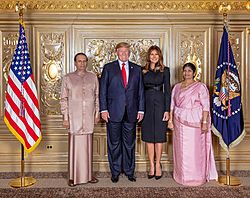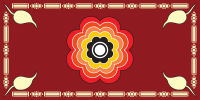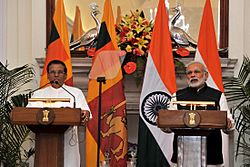Maithripala Sirisena facts for kids
Quick facts for kids
Maithripala Sirisena
|
|||||||||||||||||||||||||||||||||||||||||||||
|---|---|---|---|---|---|---|---|---|---|---|---|---|---|---|---|---|---|---|---|---|---|---|---|---|---|---|---|---|---|---|---|---|---|---|---|---|---|---|---|---|---|---|---|---|---|
|
මෛත්රීපාල සිරිසේන
மைத்திரிபால சிறிசேன |
|||||||||||||||||||||||||||||||||||||||||||||
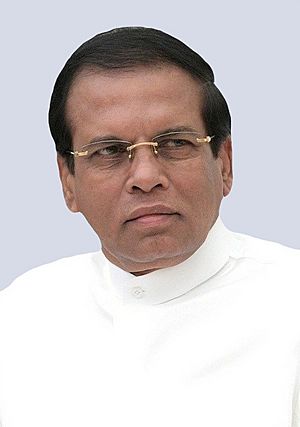
Sirisena in 2017
|
|||||||||||||||||||||||||||||||||||||||||||||
| 7th President of Sri Lanka | |||||||||||||||||||||||||||||||||||||||||||||
| In office 9 January 2015 – 18 November 2019 |
|||||||||||||||||||||||||||||||||||||||||||||
| Prime Minister | |||||||||||||||||||||||||||||||||||||||||||||
| Preceded by | Mahinda Rajapaksa | ||||||||||||||||||||||||||||||||||||||||||||
| Succeeded by | Gotabaya Rajapaksa | ||||||||||||||||||||||||||||||||||||||||||||
| Minister of Defence | |||||||||||||||||||||||||||||||||||||||||||||
| In office 12 January 2015 – 18 November 2019 |
|||||||||||||||||||||||||||||||||||||||||||||
| President | Himself | ||||||||||||||||||||||||||||||||||||||||||||
| Prime Minister |
|
||||||||||||||||||||||||||||||||||||||||||||
| Preceded by | Mahinda Rajapaksa | ||||||||||||||||||||||||||||||||||||||||||||
| Succeeded by | Gotabaya Rajapaksa | ||||||||||||||||||||||||||||||||||||||||||||
| Minister of Mahaweli Development and Environment | |||||||||||||||||||||||||||||||||||||||||||||
| In office 12 January 2015 – 18 November 2019 |
|||||||||||||||||||||||||||||||||||||||||||||
| President | Himself | ||||||||||||||||||||||||||||||||||||||||||||
| Prime Minister | |||||||||||||||||||||||||||||||||||||||||||||
| Preceded by | Susil Premajayantha | ||||||||||||||||||||||||||||||||||||||||||||
| In office 23 November 2005 – 23 April 2010 |
|||||||||||||||||||||||||||||||||||||||||||||
| President | Mahinda Rajapaksa | ||||||||||||||||||||||||||||||||||||||||||||
| Prime Minister | Ratnasiri Wickremanayake | ||||||||||||||||||||||||||||||||||||||||||||
| Succeeded by | Mahinda Yapa Abeywardena | ||||||||||||||||||||||||||||||||||||||||||||
|
|||||||||||||||||||||||||||||||||||||||||||||
|
|||||||||||||||||||||||||||||||||||||||||||||
|
|||||||||||||||||||||||||||||||||||||||||||||
| Personal details | |||||||||||||||||||||||||||||||||||||||||||||
| Born |
Pallewatte Gamaralage Maithripala Yapa Sirisena
3 September 1951 Yagoda, Dominion of Ceylon |
||||||||||||||||||||||||||||||||||||||||||||
| Citizenship | Sri Lankan | ||||||||||||||||||||||||||||||||||||||||||||
| Nationality | Sri Lankan | ||||||||||||||||||||||||||||||||||||||||||||
| Political party | Sri Lanka Freedom Party (since 1968) Communist Party of Ceylon (1966–1968) |
||||||||||||||||||||||||||||||||||||||||||||
| Other political affiliations |
Sri Lanka People's Freedom Alliance (2019–2022) United People's Freedom Alliance (2004–2019) New Democratic Front (2014–2015) People's Alliance (1994–2004) |
||||||||||||||||||||||||||||||||||||||||||||
| Spouse | Jayanthi Pushpa Kumari | ||||||||||||||||||||||||||||||||||||||||||||
| Children |
|
||||||||||||||||||||||||||||||||||||||||||||
| Relatives | Kumarasinghe (brother) Priyantha (brother) |
||||||||||||||||||||||||||||||||||||||||||||
| Alma mater | Maxim Gorky Literature Institute | ||||||||||||||||||||||||||||||||||||||||||||
| Occupation | Politician | ||||||||||||||||||||||||||||||||||||||||||||
| Signature | |||||||||||||||||||||||||||||||||||||||||||||
Maithripala Yapa Sirisena (born September 3, 1951) is a Sri Lankan politician who was the seventh President of Sri Lanka. He served from 2015 to 2019. Sirisena was the first president from the country's North Central Province. He was not from one of the powerful families that usually lead Sri Lankan politics. He later served as a member of parliament from 2020 to 2024.
Sirisena began his political career in 1989 when he was elected to the Parliament of Sri Lanka. He held many important government jobs, called ministries, starting in 1994. He was the general-secretary of the Sri Lanka Freedom Party (SLFP) and the Minister of Health.
In a surprise move in 2014, he decided to run for president against the current president, Mahinda Rajapaksa, who was also the leader of his own party. Sirisena's victory was unexpected. He won with support from rural voters and minority groups like the Tamils and Muslims.
As president, Sirisena promised to make big changes in his first 100 days. He wanted to reduce the president's power, make the courts and parliament stronger, and fight corruption. He also promised to look into accusations of war crimes from the end of the Sri Lankan Civil War in 2009.
Contents
Early Life and Career
Maithripala Sirisena was born on September 3, 1951, in a village called Yagoda. He was the oldest of twelve children. His father was a veteran of World War II who received farmland in Polonnaruwa, so the family moved there. His mother was a school teacher.
He became interested in politics as a teenager. He joined the youth group of the Sri Lanka Freedom Party (SLFP) when he was 17. In 1971, he was put in jail for 15 months because the government thought he was involved in a youth uprising. After he was released, he became more involved in national politics.
Sirisena studied agriculture and earned a diploma in 1973. In 1980, he earned another diploma in political science from the Maxim Gorky Literature Institute in Russia. He worked his way up in the SLFP, becoming a key leader in the party.
Political Career Before Presidency
Sirisena was first elected to the Parliament of Sri Lanka in 1989. He was re-elected several times. Over the years, he held many important roles in the government.
Minister in the Government
In 1994, he became a Deputy Minister of Irrigation. In 1997, President Chandrika Kumaratunga promoted him to the cabinet as the Minister of Mahaweli Development. In this role, he helped farmers and started important irrigation projects to bring water to farms.
After the 2005 presidential election, President Mahinda Rajapaksa made him the Minister of Agriculture. He started a national program called 'Api Wavamu – Rata Nagamu' (Let's Grow - Let's Build the Nation). This program encouraged people to grow their own food and helped cultivate over a million abandoned rice fields.
Minister of Health
In 2010, Sirisena was appointed the Minister of Health. He worked to reduce smoking and alcohol use in the country. He introduced a rule that required cigarette packs to have large picture warnings on them. In 2014, he was elected as a Vice President of the World Health Assembly.
Presidency (2015–2019)
In November 2014, Sirisena announced he would run for president against Mahinda Rajapaksa. He promised to end what he called a family-run government and restore democracy. His main promise was to reduce the powers of the president and give more authority to the parliament.
Sirisena won the election on January 8, 2015, with 51.28% of the vote. He was sworn in as president the next day. He promised to serve only one term.
100-Day Reform Program
Sirisena started a 100-day program to make quick changes. One of the biggest changes was the Nineteenth Amendment to the constitution. This amendment reduced the president's powers and limited a president to serving only two terms. He also passed a bill that gave citizens the Right to Information. However, not all of his promised reforms were completed.
2018 Constitutional Crisis
In October 2018, Sirisena caused a constitutional crisis. He fired the Prime Minister, Ranil Wickremesinghe, and appointed his former rival, Mahinda Rajapaksa, as the new prime minister. This move was seen as unconstitutional by many.
The Supreme Court of Sri Lanka later ruled that Sirisena's actions were illegal. After the court's decision, Rajapaksa stepped down, and Wickremesinghe was re-appointed as prime minister.
2019 Easter Bombings
On Easter Sunday, April 21, 2019, a series of terrorist bombings hit churches and hotels in Sri Lanka. Over 250 people were killed. Sirisena and his government were criticized for not acting on warnings from intelligence agencies before the attacks.
Sirisena, who was out of the country when the attacks happened, declared a national emergency. He also appointed a special commission to investigate the bombings. Prime Minister Wickremesinghe later apologized for the government's failure to prevent the attacks.
Post-Presidency
Sirisena did not run for a second term in the 2019 presidential election. He returned to parliament in 2020, winning a seat representing the Polonnaruwa district.
In 2021, the commission investigating the Easter bombings recommended that legal action be taken against Sirisena for failing to prevent the attacks. In 2023, the Supreme Court of Sri Lanka ordered him to pay 100 million rupees as compensation to the victims. He finished paying the compensation in August 2024.
In early 2024, a court temporarily stopped him from acting as the chairman of the Sri Lanka Freedom Party due to a challenge from a former party leader. He later resigned as chairman in May 2024.
Foreign Policy
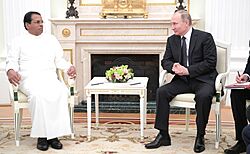
As president, Sirisena aimed to have good relationships with all countries, especially in Asia. He worked to balance Sri Lanka's ties with major powers like India and China.
Soon after becoming president, he visited India. He and Indian Prime Minister Narendra Modi signed a deal on nuclear energy. Sirisena's government focused on cooperation with all nations.
Personal Life
Sirisena is married to Jayanthi Pushpa Kumari. They have three children: two daughters, Chathurika and Dharani, and a son, Daham. He is a vegetarian and a follower of Theravada Buddhism.
In March 2015, his youngest brother, Priyantha Sirisena, died after being attacked in their hometown of Polonnaruwa.
See also
 In Spanish: Maithripala Sirisena para niños
In Spanish: Maithripala Sirisena para niños
 | Janet Taylor Pickett |
 | Synthia Saint James |
 | Howardena Pindell |
 | Faith Ringgold |


